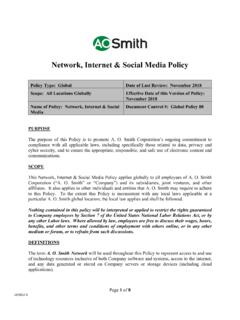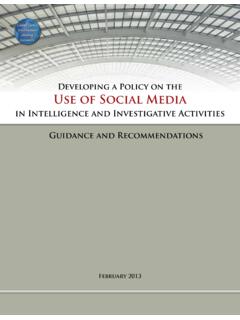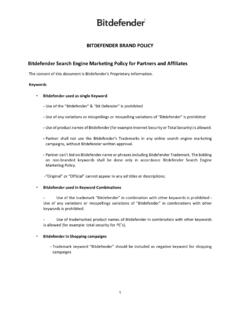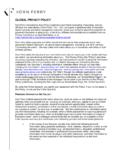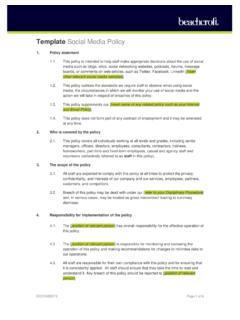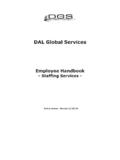Transcription of Media Globalization and its Effect ... - Global Media Journal
1 Media Globalization and its Effect upon International Communities: Seeking a Communication Theory Perspective Jeffrey K. Lyons Hawai'i Pacific University Abstract There is a growing body of research on the topic of Globalization , which seems to be a topic of broad-brush interest to scholars in a variety of fields, such as sociology, political science, ecology, international business, anthropology and communication. This paper focuses on the phenomenon of Media Globalization and examines a variety of theories that address multinational corporations with Media properties. While there are many theories that address mass communication (Gerbner, Gross, Morgan, & Signorielli, 1986; Lazarsfeld, Cantril, & Stanton, 1939; McLuhan & Powers, 1989; Schramm, 1954), this paper highlights the need for new theories which specifically address Media Globalization and the unique aspects which convergence and new digital technologies offer to the Media -user.
2 Introduction In recent years, there has been a growing body of research on the topic of Globalization . Traditional definitions of Globalization focus on economics and the effects of multinational corporations. In the book Alternatives to Economic Globalization , authors Cavanaugh and Mader (2002) referred to a number of factors that are identified with the term Globalization . These factors are: hyper-growth and exploitation of the environment, privatization of public services, Global cultural homogenization, promotion of consumerism, integration of national economies, corporate deregulation, and displacement of traditional nation-sates by Global corporate bureaucracies (p. 19). This paper examines the topic of Globalization from the perspective of the Media . The primary vehicle of the phenomenon of Global Media is the multinational corporation.
3 Media Globalization has aided in both the production and distribution of information. Dominick (2002) has noted that the production rate of information doubles every eight years. In addition, "information is being produced at a rate that is four times faster than the consumption of information" (p. 513). The phenomenon of Media Globalization along with the increasing abundance of Media -text production has produced various effects which are being researched by communication scholars. Media Globalization is a broad topic, which includes television, radio, film, music, the Internet, and other forms of digital Media . This paper will first focus upon the cultural effects of Media Globalization , and then discuss various communication theories that address this issue. After examining a number of Media theories which address Globalization , there will be a discussion on the theory which seems to best address the Media Globalization phenomenon.
4 Christopher Dixon, a Media analyst for Paine-Webber has stated that a creation of a " Global oligopoly" is taking place among a handful of multinational organizations which control worldwide Media properties. (McChesney, 2005, p. 81). Compaign (2005) identified a short list of nine Global Media corporations, which represent a variety of nations, as the major players (p. 98). These corporations and their significance will be discussed in more detail in this paper. Media Globalization shall be defined as the phenomenon of expanding multinational corporate Media investment, resulting in the emergence of a Global oligarchy of first tier corporations, which own and operate a variety of mass Media content and distribution technologies including: television, radio, film, music, broadcasting, satellite, telecommunication, cable, newspapers, magazines, publishing companies, Internet content providers, and other forms of converged digital Media .
5 [1] The Climate of Globalization Globalization is being driven by increasingly strong international market factors fueled by organizations such as the World Trade Organization (WTO) and the International Monetary Fund (IMF). The World Trade Organization was established in 1995 and as of October 2004 had 148 member nations. The WTO is located in Geneva, Switzerland. According to the WTO, they are "the only Global international organization dealing with the rules of trade between nations" ("What is the wto?" 2004). The International Monetary Fund was founded in 1945 and is located in Washington The IMF currently has 184 member nations. The goals of the IMF include: monitoring and consultation, financial assistance, and technical assistance to its members ("About the imf," 2003).
6 Other organizations which promote Globalization are: the World Bank (1946) which makes loans to developing nations, and the Trilateral Commission (1973) which focuses on trade between Japan, Europe and North America, "to foster closer cooperation among these core democratic industrialized areas of the world with shared leadership responsibilities in the wider international system" ("About the organization," 2004). The United Nations Educational, Scientific, and Cultural Organization (UNESCO) is another significant player regarding Globalization policies and discourse. UNESCO was founded in 1945 and is headquartered in Paris, France. As an agency of the United Nations, UNESCO functions as an international cultural think tank, which "serves as a clearinghouse for the dissemination and sharing of information" to its 190 member nations in the areas of "education, science, culture and communication.
7 " One of the ambitious goals of UNESCO is to "to build peace in the minds of men" ("About unesco," 2003). MacBride and Roach (2000) pointed out, that the UNESCO constitution which was adopted in 1946 addressed the flow of international information by charging the agency to "collaborate in the work of advancing the mutual knowledge and understanding of peoples, through all means of mass communication and to that end recommend the free flow of ideas by word and image" (p. 287). In 1978, UNESCO published The Declaration on Fundamental Principles Concerning the Contribution of the Mass Media . Article VII of The Declaration refers to, "the mass Media contribut[ing] effectively to the strengthening of peace and international understanding, to the promotion of human rights, and to the establishment of a more just and equitable international economic order" ("Declaration on the mass Media ," 1978).
8 Without question, the driving force behind Globalization is motivated by economic interests. Much of the current climate of international investment and Global business is a direct result of Global reconstruction, which followed World War II. Both the World Bank and the International Monetary Fund were founded within a few years after the end of World War II. Critics of Globalization say that capitalism is the driving force behind world economics. According to Amnesty International (2000), "of the 100 largest economies in the world, 51 are now Global corporations; only 49 are countries" (p. 187). Critics of Globalization , such as Amnesty International (AI) are concerned that developing nations are losing their national sovereignty and that human rights violations are taking place. According to AI, "They [developing nations] have diminishing power to control mergers, take-overs and liquidations, may not know who plans to buy or sell a major industry or utility; a telephone, TV or water company may change ownership overnight" (p.)
9 188). Media Globalization and Corporate Expansion Media Globalization has been a natural extension of corporate expansion on an international scale. Post World War II reconstruction through organizations such as the World Bank and the International Monetary Fund helped to spread Globalization through financial investment. In 1974, UNESCO published a study by researchers Nordenstreng and Varis. MacBride and Roach (2000) reviewed the 1974 UNESCO study and noted that, "The study demonstrated that a few Western nations controlled the international flow of television programs, with the United States, the United Kingdom, France, and the Federal Republic of Germany accounting for the largest shares" (p. 289). According to MacBride and Roach (2000), Media Globalization gained further momentum in the 1980's, when a prevailing policy of deregulation of Media in many developing nations along with openness to private investment occurred (p.
10 289). McChesney (2005) also noted this trend of free-market deregulation occurring in the eighties and the nineties, in the cable and digital satellite systems around the world. Head, Spann and McGregor (2001) noted that in the mid-1980's privatization and deregulation gained momentum in Europe, in the cable and telephone industries, through foreign investment from companies such as: Ameritech International, Deutsche Telecom, West, and Bell Atlantic (p. 414). Some nations have only recently allowed foreign investment in communications industries. In the case of China, the admittance into the World Trade Organization was a benefit that outweighed the past reluctance towards foreign investment in their national telecommunications infrastructure. China changed its official policy in 1999, as a required component of its acceptance into the World Trade Organization.
